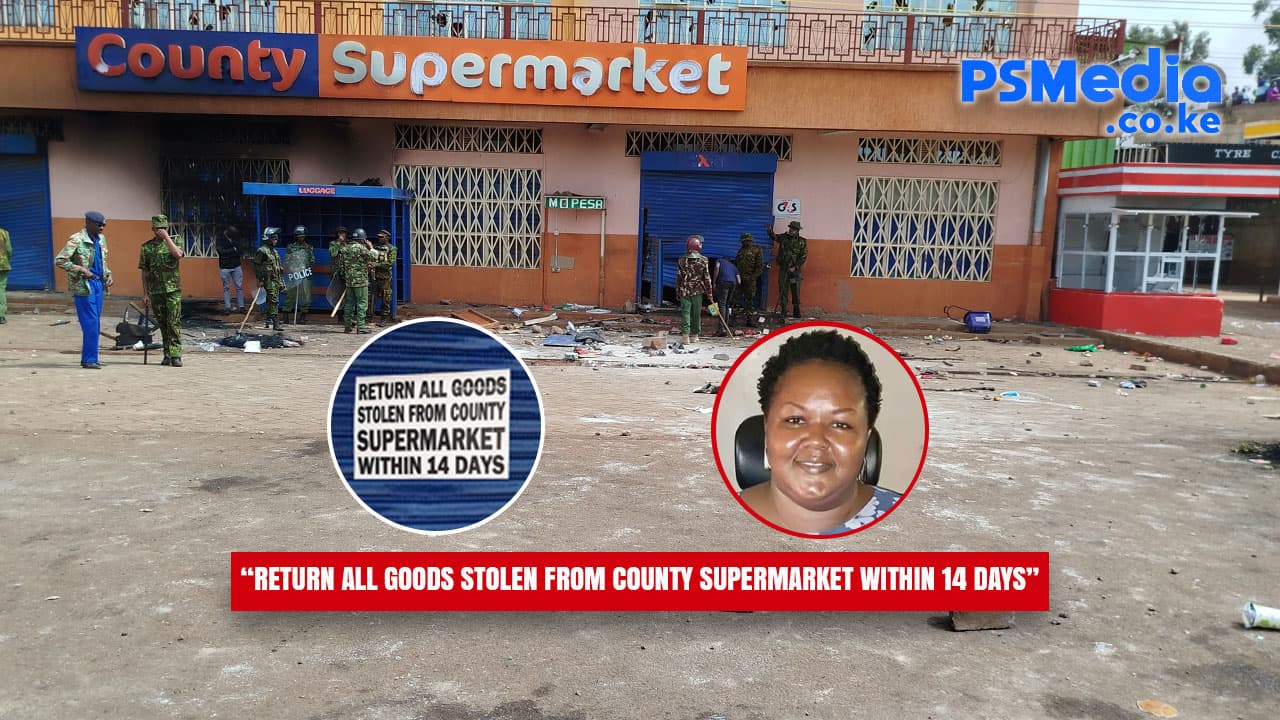In a dramatic turn of events following the chaos of the July 7 Saba Saba demonstrations, individuals who vandalized and looted County Supermarket are now living in fear. Annabel Wanjiku, the owner of the supermarket, has issued a stern warning to those responsible, demanding the return of stolen goods or facing unspecified repercussions.
The aftermath of the protests left the supermarket grappling with a staggering loss of KSh 200 million, a hefty sum that highlights the extent of the damage caused. Local residents witnessed the unprecedented mayhem as the supermarket became a primary target during the riots, leading to extensive property vandalism and theft.
In an attempt to reclaim her losses and restore order, Wanjiku has taken an unusual approach. Posters have cropped up across Murang’a, prominently displayed on the doors of County Supermarket and various locations throughout the town. The posters, emblazoned with the bold message, “Return all goods stolen from County Supermarket within 14 days,” have ignited a wave of anxiety among those implicated in the looting.
While the ultimatum is clear, the notices leave much to the imagination. The lack of specific consequences for noncompliance has led to rampant speculation among locals. Some ponder whether Wanjiku will launch legal action, while others wonder if community pressure might be employed to encourage the return of the stolen goods.
“I never thought it would come to this,” said a local resident who wished to remain anonymous. “But I can’t blame her. Losing KSh 200 million is no small matter. People need to do the right thing.”
Wanjiku’s unique approach has sparked conversations in the community about accountability and the role of business owners in the aftermath of civil unrest. Many acknowledge the importance of supporting local businesses like County Supermarket, especially in times of crisis.
Wanjiku's message is resonating, prompting some to voluntarily return items or at least engage in discussions about restitution. “We need to make things right,” said another resident. “This isn’t just about money; it’s about community pride and integrity.”
Experts on social behavior suggest that the response to Wanjiku’s warning could vary across the community. Some individuals may choose to comply out of guilt or a sense of moral obligation, while others might opt for silence, fearing retribution or legal consequences.
As the 14-day deadline approaches, tension in the community is palpable. Those who took part in the disturbances are feeling the heat, with many reportedly discussing the situation among themselves, weighing their options. Will they return the stolen goods, or will they risk the unknown consequences hinted at on the ominous posters?
While the outcome remains uncertain, the incident has ignited conversations about the social fabric of Murang’a and the collective responsibility of its citizens. As Wanjiku fights to rebuild her business and restore her community, one thing is clear: the events of July 7 will not be forgotten, and the lessons learned may shape the future of Murang’a’s resilience when facing adversity.
Only time will tell if the stolen goods are returned and if harmony can be restored within this community of hardworking individuals.



